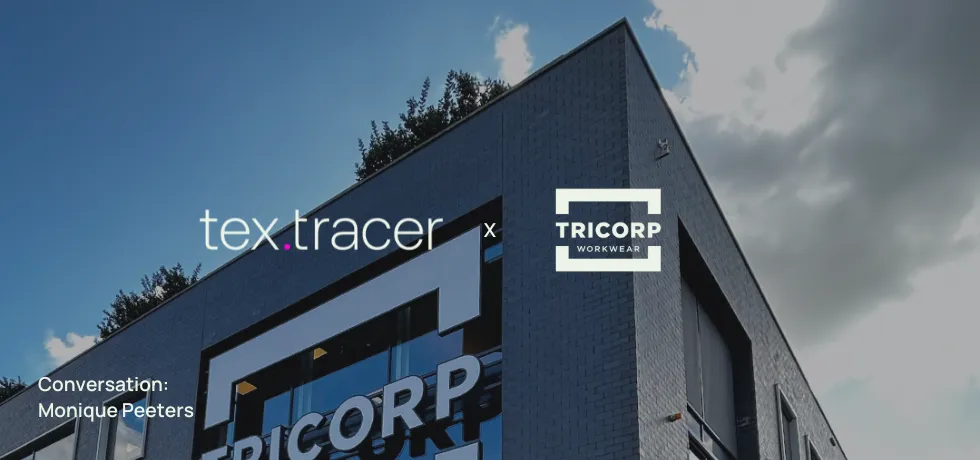We need to go beyond one circular collection and really create change from within the core of our activities.
A while ago, we spoke with Monique Peeters, about her role, Tricorp’s ambitions, and the projects she is working on.
What is your current role at Tricorp?
“I am a CSR-product specialist at Tricorp. I work with the Research and Development team to ensure we make responsible decisions during the product development of an article. We focus on safe and sustainable product design, and are really looking at the whole process together with the supplier. In the upcoming time we want to concentrate on improving the contact and relationship with our suppliers and improve the product from there.
What are Tricorp’s sustainability goals?
Our sustainability goals reflect responsible manufacturing and match upcoming regulations and recent guidelines like the EU strategy on sustainable and circular textiles, the Extended User Responsibility regulation (UPV), the proposal by the Next Generation Agreement etc.
How does Tricorp contribute to improving the fashion industry on social and environmental level?
In the past year, we have sharpened our focus and because of that we have been making bigger steps. Tricorp has big ambitions but is very dependent on many different factors to really create impact. We also really believe in improving the industry on the basis of projects, tackling specific issues through a project, like what we do with tex.tracer. We really believe in the process itself, because we learn so much from it. We also do many projects on the topic of social issues, like freedom of association that we have going on in Vietnam. Additionally, we think we should educate the workers at the facilities to negotiate and stand up for their rights. That is a very important role to take on as well, even though we are considered a small client for the supplier. It helps us to better understand how to do our part in International Corporate Social Responsibility. That is why a project like tex.tracer is very valuable for us to see what is happening at our suppliers.
How do suppliers react to you asking them about their chain?
At the start of the product development Tricorp gives their product specification to the supplier and we discuss the consequences of finding more sustainable or safe alternative materials if needed. The knowledge gained helps us both. Suppliers are willing to share information even though the amount of detail asked is more than it was. We explain to them that product transparency is not a trend but a must for the future. The tex.tracer platform can help them to prepare for the future as a global supplier.
Can you tell some background information about Tricorp and its sustainability vision, how has this developed throughout the years?
A couple of years ago, Tricorp made the decision to become more involved in corporate sustainability. Up until a year ago we were still struggling to figure out what the best next steps were to take. Additionally, we were trying to figure out what all these different definitions mean, like circularity, not only what actually is it, but also when do you achieve it? The intention was there, and we know we need to go beyond one ‘circular collection’ and really create change from within the core of our activities. Throughout the years we have found our way and made better decisions.
What challenges do you face in your current role?
Doing our own sourcing and sustainable product development requires an extensive administration of all process and product details. It is hard to keep up with receiving the information and sharing it internally or with customers. One needs a good digital support system. Secondly we need to ask our suppliers the correct questions. We need to avoid to push for certifications or labels that overlap and avoid unnecessary cost and effort from the supplier. The tex.tracer format makes that we ask relevant information without asking the same information twice. I am excited be working with the suppliers to make it work. It requires persuasiveness in combination with patience though.
What is the added value of transparency and tex.tracer for Tricorp?
tex.tracer helps to digitally map the whole process of the developing each product in a collection. From the development phase till purchasing the article. Our customers and consumers request more and more insight in the article. By completing the tex.tracer steps we better understand the interaction between our sub suppliers. It takes time and effort but in the end, I believe, we create a better product together in a more efficient way. The QR-code is very useful, for a later stage. It will give us relevant information which we can share and be proud of. Furthermore, now that we have full transparency into our Tier 1 suppliers, we are able to find out what the risks are to a great extent, mitigate them and essentially prevent them from happening. It will be part of the new reality, new norm, to have full transparency and responsibility throughout your chain. The QR-code is very useful, for a later stage. It will give us relevant information which we can share and be proud of.
What latest developments at Tricorp are you proud of?
We are improving our relationship with our suppliers: issues are shared and discussed. My learning curve on safe and sustainable product design has grown a lot and I look forward sharing it internally to grow.
You are working on a lot of nice projects, great things are ahead! It was lovely to get to know you better and finding out more about your work at Tricorp. We hope we can continue are collaboration and make a change in the industry!
Want to read more about Tricorp’s sustainability efforst? Click here: https://tricorp.com/en/our-responsibility/our-responsibility




